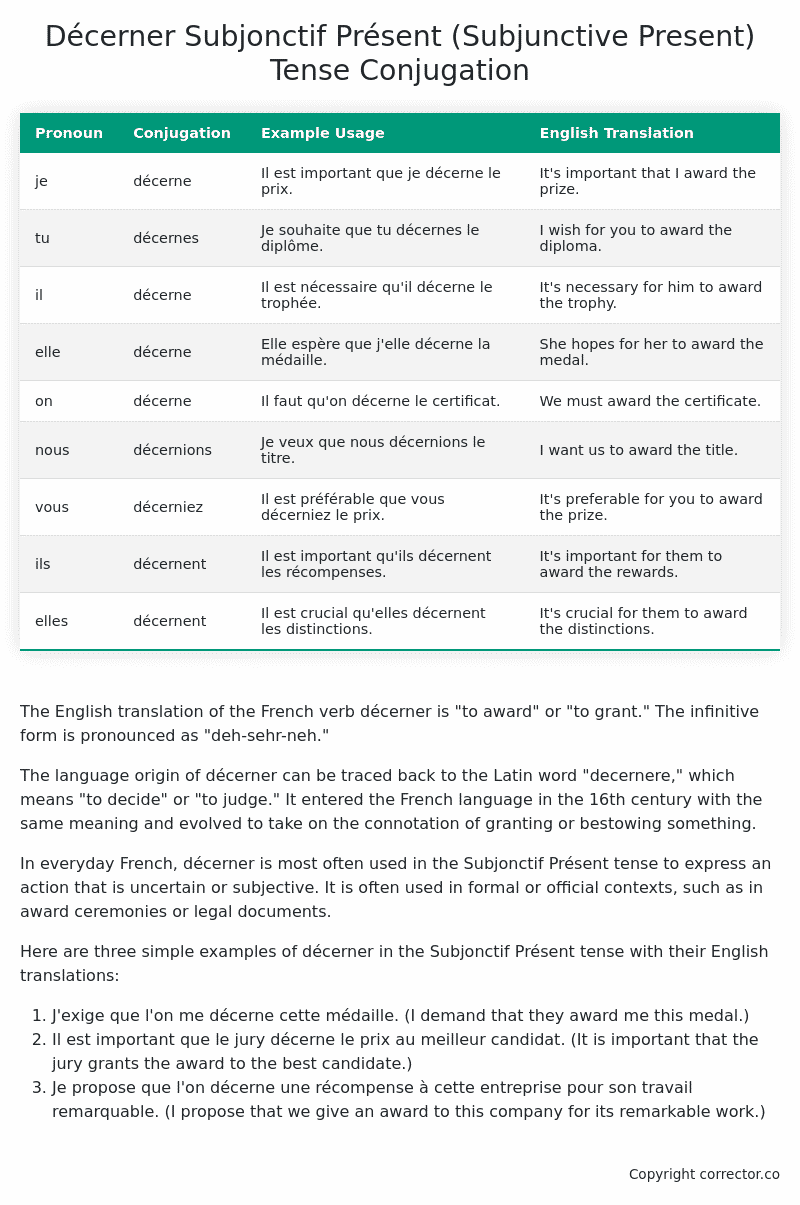Subjonctif Présent (Subjunctive Present) Tense Conjugation of the French Verb décerner
Introduction to the verb décerner
The English translation of the French verb décerner is “to award” or “to grant.” The infinitive form is pronounced as “deh-sehr-neh.”
The language origin of décerner can be traced back to the Latin word “decernere,” which means “to decide” or “to judge.” It entered the French language in the 16th century with the same meaning and evolved to take on the connotation of granting or bestowing something.
In everyday French, décerner is most often used in the Subjonctif Présent tense to express an action that is uncertain or subjective. It is often used in formal or official contexts, such as in award ceremonies or legal documents.
Here are three simple examples of décerner in the Subjonctif Présent tense with their English translations:
- J’exige que l’on me décerne cette médaille. (I demand that they award me this medal.)
- Il est important que le jury décerne le prix au meilleur candidat. (It is important that the jury grants the award to the best candidate.)
- Je propose que l’on décerne une récompense à cette entreprise pour son travail remarquable. (I propose that we give an award to this company for its remarkable work.)
Table of the Subjonctif Présent (Subjunctive Present) Tense Conjugation of décerner
| Pronoun | Conjugation | Example Usage | English Translation |
|---|---|---|---|
| je | décerne | Il est important que je décerne le prix. | It’s important that I award the prize. |
| tu | décernes | Je souhaite que tu décernes le diplôme. | I wish for you to award the diploma. |
| il | décerne | Il est nécessaire qu’il décerne le trophée. | It’s necessary for him to award the trophy. |
| elle | décerne | Elle espère que j’elle décerne la médaille. | She hopes for her to award the medal. |
| on | décerne | Il faut qu’on décerne le certificat. | We must award the certificate. |
| nous | décernions | Je veux que nous décernions le titre. | I want us to award the title. |
| vous | décerniez | Il est préférable que vous décerniez le prix. | It’s preferable for you to award the prize. |
| ils | décernent | Il est important qu’ils décernent les récompenses. | It’s important for them to award the rewards. |
| elles | décernent | Il est crucial qu’elles décernent les distinctions. | It’s crucial for them to award the distinctions. |
Other Conjugations for Décerner.
Le Present (Present Tense) Conjugation of the French Verb décerner
Imparfait (Imperfect) Tense Conjugation of the French Verb décerner
Passé Simple (Simple Past) Tense Conjugation of the French Verb décerner
Passé Composé (Present Perfect) Tense Conjugation of the French Verb décerner
Futur Simple (Simple Future) Tense Conjugation of the French Verb décerner
Futur Proche (Near Future) Tense Conjugation of the French Verb décerner
Plus-que-parfait (Pluperfect) Tense Conjugation of the French Verb décerner
Passé Antérieur (Past Anterior) Tense Conjugation of the French Verb décerner
Futur Antérieur (Future Anterior) Tense Conjugation of the French Verb décerner
Subjonctif Présent (Subjunctive Present) Tense Conjugation of the French Verb décerner (this article)
Subjonctif Passé (Subjunctive Past) Tense Conjugation of the French Verb décerner
Subjonctif Imparfait (Subjunctive Imperfect) Tense Conjugation of the French Verb décerner
Subjonctif Plus-que-parfait (Subjunctive Pluperfect) Tense Conjugation of the French Verb décerner
Conditionnel Présent (Conditional Present) Tense Conjugation of the French Verb décerner
Conditionnel Passé (Conditional Past) Tense Conjugation of the French Verb décerner
L’impératif Présent (Imperative Present) Tense Conjugation of the French Verb décerner
L’infinitif Présent (Infinitive Present) Tense Conjugation of the French Verb décerner
Struggling with French verbs or the language in general? Why not use our free French Grammar Checker – no registration required!
Get a FREE Download Study Sheet of this Conjugation 🔥
Simply right click the image below, click “save image” and get your free reference for the décerner Subjonctif Présent tense conjugation!

Décerner – About the French Subjonctif Présent (Subjunctive Present) Tense
Formation of the Subjonctif Présent
Common Everyday Usage Patterns
Interactions with Other Tenses
Summary
I hope you enjoyed this article on the verb décerner. Still in a learning mood? Check out another TOTALLY random French verb conjugation!


